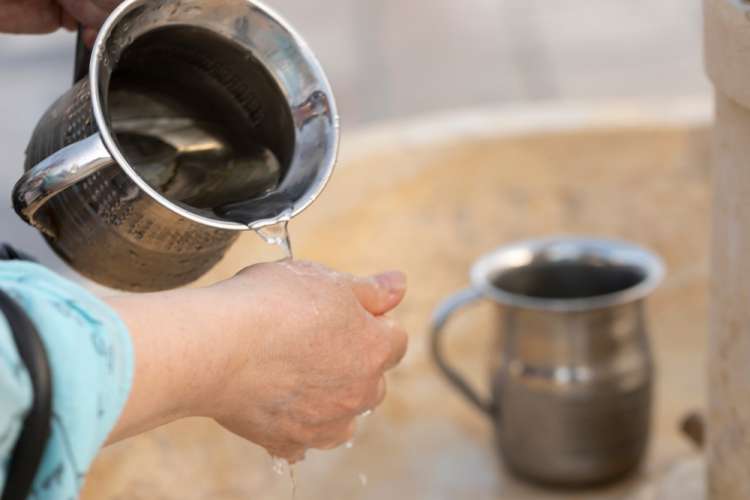Chaza”l enacted a requirement of Netilas Yadayim upon awakening in the morning, and there are many Halachic details and intricacies related to this Takana. This week’s essay will review particular issues relevant to patients with physical limitations and/or confined to bed, either at home or in the hospital, and who are unable to easily perform Netilas Yadayim.
- Touching Parts of the Body
Sometimes, a person needs to touch his mouth or nose (or other sensitive areas of the body) when waking up to adjust a medical device, take his temperature, or for other reasons. The Shulchan Aruch (O.C. 4:3) rules that a person may not touch his mouth, nose, ears, or eyes before Netilas Yadayim. The Mishna Berura (ibid. 13) adds that some also forbid touching the anus, head of the penis[1], or the site he had been bled from [during bloodletting] because doing so leads to the Ruach Ra’ah damaging all of one’s orifices.
There are two possible solutions: Either perform the necessary actions without touching the device [or body] itself or use a cloth (or glove) as a Chatzitza (interposition).[2]
- Walking Four Amos
One may not walk four Amos before Netilas Yadayim. The Mishna Berura explains (1:2):
Immediately upon awakening [when] he no longer wishes to sleep, he should wash his hands, even as he remains prostrate. Certainly, he should not walk four Amos without Netilas Yadayim. A person should be extremely careful about this. The Zohar haKadosh describes the punishment for [failing to do] this in extreme terms, for he leaves the Ruach Tumah upon himself.
However, there are many people, particularly among the elderly population, who need to relieve themselves as soon as they awaken. If they have a vessel for Netilas Yadayim next to their beds, they should wash their hands immediately and then go to the bathroom. If not, they may walk four Amos (or more) to the bathroom because a person may not delay relieving himself (Mishna Berura, ibid.).
Regarding the Mishna Berura’s stern warning about doing Netilas Yadayim before walking four Amos, though the Zohar does indeed state that failing to do so is a serious matter, many Acharonim say that today one may be more lenient. Their reasoning is fascinating. During the days of the Vilna Gaon, a great Kiddush Shem Shamayim occurred at the hands of the famous and lofty Ger Tzedek Avraham ben Avraham (Count Valentin Potocki) Hy”d, who was Moser Nefesh al Kiddush Hashem. The Ya’avetz describes the events (in his Sefer, “Vayakam Edus l’Yaakov”):
Several years ago in Vilna, the capital of Lithuania, the following event occurred. An important official from the Potocki family converted to Judaism. They arrested him and incarcerated him for many days, thinking that he would return to their faith. Though he knew that he would not be spared torture and a cruel death if he did not recant, and they [the Catholic Church] wanted to save him from death and from the grave punishment, more bitter than death, that was destined for him if he would hold his ground, he did not turn to them [for mercy] nor [did he pay heed] to the pleading of his mother… he did not have any desire for the pleasure of this world, nor was he frightened or concerned about death or the terrible torture that he would be subjected to. After waiting for a long time, they took pity on him out of respect for his family. But he mocked all of the daily attempts of the priests to convince him… he chose an extended execution with extraordinary torture over life in a temporal world; he accepted and suffered it with love and died Al Kiddush Hashem.
The Sefer Halichos Shlomo (Tefila 20, footnote 49) quotes Rav Shlomo Zalman Auerbach zt”l who attested that he had a tradition from the Vilna Gaon that following the execution of the Ger Tzedek of Vilna, the Ruach Tumah of the morning had been weakened. Therefore, although Rav Shlomo Zalman himself was particular not to walk four Amos before Netilas Yadayim, other Poskim are lenient.
Those who are stringent in this matter are commendable. However, they should bear in mind that this must not lead to the violation of other Issurim (such as delaying relieving oneself, as explained above).
- Taking Medications Before Netilas Yadayim
Patients, particularly those who are bedridden, often need to eat, drink, and/or take medications immediately when they wake up. What if they are unable to do so before Netilas Yadayim?
The Shulchan Aruch rules (ibid. 4:5) that one may not touch food or drink before Netilas Yadayim. [The Mishna Berura states (ibid. 14) that if one does touch food or drink, it does not become forbidden, Bedieved, butit should be washed three times. However, the Lev Chaim[3] (1:67) is extremely stringent in this regard.]
Therefore, if possible, a patient should attempt to eat or drink using a fork or spoon or while wearing a glove rather than touching the food or drink. Alternatively, he should ask somebody to feed him (though, in those circumstances, it might be more practical to ask the other person to help him wash Netilas Yadayim).
We should note that to recite Brachos or to Daven, it is sufficient to wipe one’s hands on a cloth. Likewise, whenever he needs to recite a Bracha on food, at a minimum, he should wipe his hand on some paper or a napkin.
- Reciting Devarim sheb’Kedusha
Patients who are unable to get out of bed without assistance may find that they awaken not long before Sof Zman Krias Shema and are unable to wash their hands before the time passes. Therefore, he must recite Krias Shema before performing Netilas Yadayim. The Shulchan Aruch rules (ibid. 4:23) that a person should not Daven nor recite Krias Shema before Netilas Yadayim. (The same applies to learning Torah.) Mei’Ikar haDin, he may recite Birchos haNehenin, Birchos haTorah, respond Amen, etc. (see Mishna Berura ibid. 59) and learn Torah without Netilas Yadayim. However, if there is any concern that he has touched Mekomos haMechusim (areas of the body that are usually covered) or areas of the body that are dirty, he must wash his hands, Lechatchila (Mishna Berura ibid. 61), or at least wipe them on a cloth (Shulchan Aruch and Mishna Berura ibid.). Therefore, in our case, the patient should wipe his hands with a cloth before reciting Krias Shema.
Regarding studying Torah, the easiest thing is to learn without enunciating the words, which is permissible before Netilas Yadayim (unless one’s hands are actually dirty, rather than merely having come into contact with Mekomos haMechusim. See Mishna Berura, 85:15 and Biur Halacha 92, s.v. “v’Lachen Asur”.) If a person wants to enunciate the words, he should wipe his hands on a cloth (1:2, ibid.)
- Washing Another Person’s Hands
Some patients (such as those with hand or arm injuries or those with Parkinson’s disease or other motor disorders) are unable to perform Netilas Yadayim themselves. If there is no other option, it is sufficient Bedieved to pour water just once on each hand (Biur Halacha 4, s.v. “Yedakdek”). If possible, it is better to try to wash each hand three times in a row (if alternating the hands is too difficult).
If somebody is available to help him, that person should ensure to wash his own hands before helping the patient (Shulchan Aruch, O.C. 4:11). Someone who merely brings the water to the patient does not need to wash his own hands first (Mishna Berura ibid. 23).
It is common that nurses and other caregivers are not Torah-observant and are unlikely to have washed Netilas Yadayim. In this situation, one may assume that they will at least have washed their hands in the morning (though not in a Halachic fashion) and may rely on that Bedieved (Halichos Shlomo Tefila 20, footnote 25 and Teshuvos v’Hanhagos 1:1).
Ideally, a man should not have a woman other than his wife assist him, though this is not Asur Min haDin (see Kaf haChaim 4:28). See also the Kaf haChaim[4] (ibid.) in the name of the Lev Chaim, as well as the Ben Ish Chai (Toldos, Year 1:12) and Chida (Moreh b’Etzba 2:61) regarding a woman who is a Nida or whom one suspects may be impure due to Tumas Nida.
The Pri Megadim rules that one may be assisted by a non-Jew (see O.C. 4:7); however, the Kaf haChaim (ibid.) relates that the Lev Chaim was stringent.
How should one assist another in performing Netilas Yadayim? The Kaf haChaim (4:36) explains that one should take the vessel in his right hand and begin by washing the right hand of the other person, and so forth.
[1] Even if one is married. [Editor’s note: See Shulchan Aruch O.C. 3:14.]
[2] This solution is also suggested by the Mishna Berura in another context. The Shulchan Aruch rules (O.C. 46) that when a person places his hands over his eyes (upon awakening) he should recite the Bracha, “Pokei’ach Ivrim”. How may he touch his eyes before Netilas Yadayim? The Mishna Berura answers that he can do so with a cloth (ibid. 6).
[3] R’ Chaim Palagi zt”l (1787-1868) was a Posek and Mekubal and served as the Chacham Bashi of Izmir, Turkey in the Ottoman Empire. He wrote many Sefarim on Tanach, Talmud, Midrashim and Derashos, Mussar, Halacha, Kabbala, and Shu”t, among other topics.
[4] R’ Yaakov Chaim Sofer zt”l (1870-1939) was born in Baghdad and settled in Yerushalayim in 1904. The ten volumes of Kaf haChaim cover all of Orach Chaim and parts of Yoreh Deah and include many references to Kabbala.















Add comment